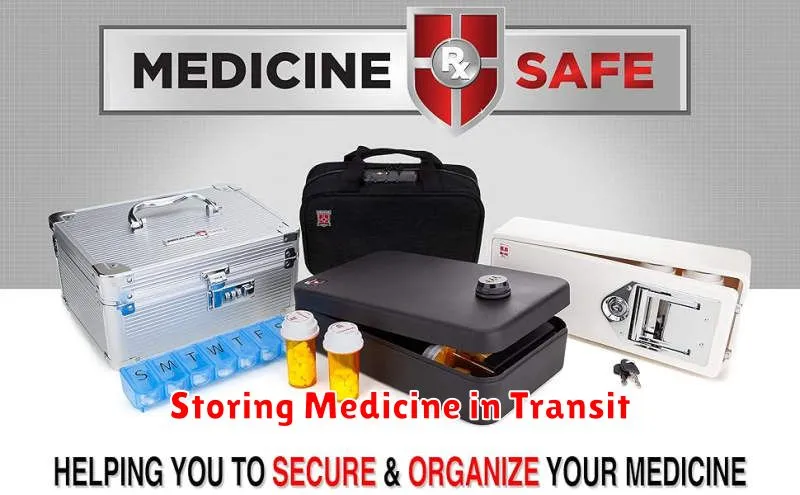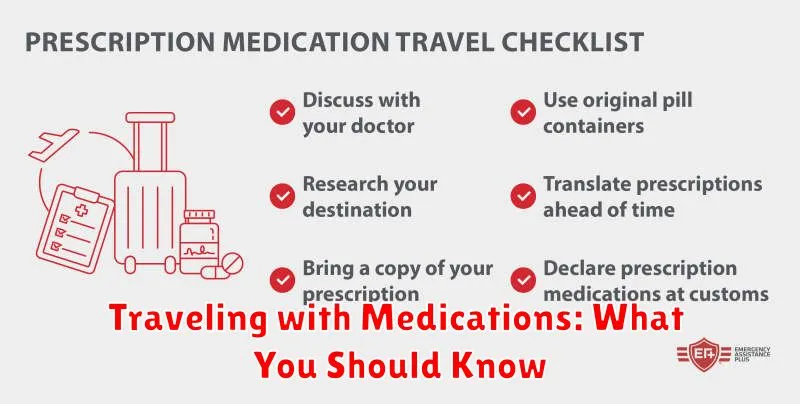Traveling, whether for business or leisure, often requires careful planning, especially when medications are involved. Navigating airport security and foreign regulations with your necessary prescriptions and over-the-counter medications can be daunting. This article provides essential information for traveling with medications, covering everything from packing tips and documentation requirements to understanding international regulations and managing potential health issues related to your medications while abroad. Learn how to prepare properly and travel with confidence while ensuring you have access to the medications you need.
Traveling with medications necessitates understanding the rules and regulations surrounding the transport of prescription drugs and other medications. From carrying the correct documentation to ensuring proper storage throughout your journey, pre-trip preparation is crucial. This guide will help you understand the key considerations for traveling with medications, including strategies for managing different time zones, potential side effects from travel, and what to do in case of lost or stolen medications. Ensure a smooth and healthy trip by being well-informed about the proper procedures for traveling with medications.
Checking Medication Rules in Your Destination
Traveling internationally with medication requires careful planning. Regulations vary significantly between countries, and some medications considered over-the-counter in your home country may be illegal or require a prescription elsewhere. Failing to comply with local laws can result in serious consequences, including confiscation of your medication, fines, or even detention. Before your trip, research the specific medication laws of your destination.
Start by checking the official government website of the country you are visiting, or consult your own country’s embassy or consulate for their destination-specific advice. Look for information regarding allowed medications, required documentation such as prescriptions or doctor’s letters, and any quantity restrictions. It’s crucial to carry your medication in its original packaging, clearly labeled with the prescription information and your doctor’s details.
If you require medication that is restricted or prohibited in your destination, contact the nearest embassy or consulate of that country well in advance of your travel dates. They can provide guidance on the necessary documentation and procedures for obtaining approval to bring your medication. Additionally, consider consulting your doctor about potential alternative medications that may be permitted in your destination. Proper planning will ensure a smooth trip and avoid potential legal issues.
Carrying Prescriptions Safely
Safeguarding your prescriptions is crucial for both your health and safety. When carrying medications, especially controlled substances, always keep them in their original containers. This helps prevent accidental ingestion by others, protects the medication from damage or degradation, and allows for easy identification in case of emergencies. Avoid storing medications in purses, backpacks, or glove compartments for extended periods, as extreme temperatures can affect their potency. If traveling by air, it’s recommended to keep prescriptions in your carry-on luggage to prevent loss or delay.
Be mindful of the quantity of medication you carry. Bringing excessive amounts can raise suspicion and may violate regulations, especially when traveling internationally. Only carry the amount needed for your trip, plus a small buffer in case of unforeseen delays. If you require a larger quantity due to a medical condition, ensure you have proper documentation from your physician, including a prescription and a letter explaining the medical necessity.
Privacy is also an important consideration. Avoid discussing your medications with strangers and keep your prescriptions out of sight. Be aware of your surroundings and take precautions to prevent theft, especially in crowded areas. If you have concerns about the security of your medications, consider using a discreet carrying case or pouch. Remember to properly dispose of expired or unwanted medications by consulting your pharmacist or local authorities for safe disposal guidelines.
Storing Medicine in Transit

Proper storage of medicine during transit is crucial to maintain its efficacy and safety. Temperature fluctuations, exposure to light, and physical shock can degrade many medications, rendering them ineffective or even harmful. Therefore, it’s essential to take appropriate precautions to protect pharmaceuticals during transportation, whether it’s across town or across the country.
Key considerations include using insulated containers and temperature monitoring devices, especially for temperature-sensitive medications. The type of packaging and coolant used should be appropriate for the required temperature range and duration of transport. Adequate padding and cushioning can minimize the risk of damage from vibrations and impacts. Clear labeling, including storage instructions and any special handling requirements, should be affixed to the exterior of the package.
Finally, adherence to all applicable regulations is essential. This includes complying with federal and state laws, as well as any carrier-specific guidelines for transporting medications. Proper documentation should accompany the shipment, ensuring traceability and accountability throughout the transit process.
Declaring Medications at Customs
When traveling internationally, it is crucial to understand the regulations surrounding bringing medications across borders. You must declare all medications, both prescription and over-the-counter, to customs officials upon arrival. This includes vitamins, supplements, and herbal remedies. Failure to declare medications can result in penalties, including confiscation of the items and potential legal consequences.
For prescription medications, it is highly recommended to carry a copy of your prescription or a letter from your doctor detailing your medical condition and the prescribed medication. This documentation should clearly state the generic name of the medication, dosage, and frequency. It is generally advisable to keep medications in their original packaging, clearly labeled with your name and the prescribing physician’s information. While specific regulations vary by country, carrying a sufficient amount of medication for your personal use during your trip is generally permissible. Excessively large quantities may raise suspicion and require further explanation.
Researching the specific medication import regulations of your destination country before your trip is essential. Some countries have strict regulations on certain substances, even those commonly available over-the-counter in other places. Check the embassy or consulate website of your destination country for the most accurate and up-to-date information. Being prepared and following these guidelines will ensure a smooth and hassle-free customs experience.
Getting Replacements Abroad
Securing replacements for lost or damaged items while traveling internationally can be challenging but achievable. Contact your insurance provider immediately to report the incident and determine coverage. Keep all documentation, including police reports (if applicable), purchase receipts, and baggage claim tags. This documentation will be crucial for your claim. Your insurance provider can guide you through their specific process for overseas replacements or reimbursements. They may have preferred vendors or specific procedures depending on the item and your location.
If the lost or damaged item is essential for your trip, explore local options for temporary replacements. Pharmacies, general stores, and electronics retailers can often provide temporary solutions. Remember to retain receipts for these purchases, as they may be eligible for reimbursement depending on your insurance policy. Consider contacting your credit card company as some offer purchase protection or travel insurance benefits that may assist you.
For high-value items, be prepared for a more involved process. Replacement may not be immediate, and shipping or customs procedures could add complexity. Maintain clear communication with your insurance provider throughout the process. They will be your primary point of contact for navigating these complexities and ensuring you receive the appropriate replacement or reimbursement.
Translations and Doctor Letters
Accurate medical translations are crucial for effective cross-cultural healthcare. Translating doctor letters, medical reports, and other health documents ensures patients understand their diagnoses, treatment plans, and overall health information. Professional translators with expertise in medical terminology should be used to maintain accuracy and confidentiality.
Doctor letters often contain complex medical jargon, requiring specialized knowledge for accurate translation. Mistranslations can lead to misdiagnosis, incorrect treatment, and potentially harmful outcomes. Key information such as medications, dosages, allergies, and medical history must be translated precisely. This ensures the patient receives appropriate care, regardless of language barriers.
When seeking translation services for doctor letters, consider factors like the translator’s qualifications, experience with medical terminology, and adherence to privacy regulations. Choosing a certified medical translator can significantly reduce the risk of errors and ensure clear communication between healthcare providers and patients.
Keeping Your Health a Priority
Maintaining good health is crucial for a fulfilling life. This involves a holistic approach encompassing physical, mental, and emotional well-being. Prioritizing your health doesn’t require drastic changes but rather consistent, small steps towards a healthier lifestyle. Focus on incorporating regular exercise, a balanced diet, and adequate sleep into your daily routine. These foundational habits form the bedrock of a healthy lifestyle.
Beyond the basics, paying attention to your mental and emotional health is equally important. Managing stress through techniques like mindfulness or meditation can significantly impact your overall well-being. Stress management is not a luxury but a necessity in today’s fast-paced world. Cultivating strong social connections and engaging in activities you enjoy also contribute to a positive mental state. Remember to schedule regular check-ups with your doctor and dentist for preventive care and early detection of any potential health issues.
Making your health a priority is an investment in your future. By focusing on these key areas, you can improve your quality of life and increase your chances of enjoying a long and healthy life. Small changes implemented consistently yield significant results over time. Start today, and your future self will thank you.

